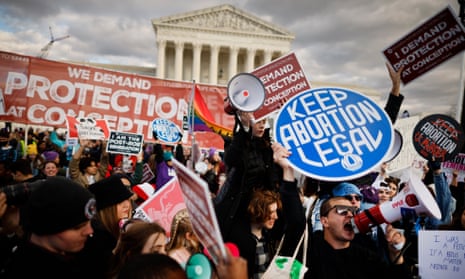That it has only been a year since the US supreme court overturned Roe v Wade and ended the federal right to an abortion feels absurd, almost impossible. How horribly and dramatically our country has changed since then. In a span of just 12 months, thousands of lives have been permanently changed – dreams dashed, intentions scuttled, childhoods abruptly ended, talents and potential suppressed, health risked, and the self-determination of pregnant women snatched from them by a body of unelected jurists who believe that their own sentiments are more important than those women’s dignity.
The decision unleashed atrocities and morbid perversions of medical ethics that have rapidly become routine. Women experiencing miscarriages now wait around in emergency rooms and parking lots, unable to receive treatment until they sicken to the point where sufficiently brutal health outcomes (life-ending or life-altering, depending on the state) become a certainty. Other women, and no small number of girls, now gestate and give birth to infants conceived by their rapists – their coaches, abusive boyfriends, acquaintances, priests, fathers. Still others are forced into torturously monstrous exercises in medical futility, their bodies commandeered and used by the state to birth babies without lungs or heads.
Any one of these scenarios is the stuff of a horror movie, episodes of legally mandated medical sadism that makes a mockery of the principles of liberty, equality, privacy or due process. But the anti-choice movement also seems to be determined to bring an end to free speech: when an Indiana doctor, Caitlin Bernard, spoke to the media about performing an abortion on a raped 10-year-old girl who had had to flee Ohio for the procedure, Indiana state Republicans set about a year-long campaign of harassment and intimidation meant to punish her for speaking publicly about the reality that their policies had created.
All of this was predictable. All of it was, in fact, predicted by the pro-choice movement, whose size, institutional knowledge and internal variance did not earn it respect from either the Democratic establishment or the movement left. And it was all predicted, too, by the anti-choice movement, one of the largest and best-funded hate campaigns in the nation’s history, whose habitual bad faith and single-minded commitment to ensuring women’s suffering ushered in the human rights catastrophe of the post-Dobbs era entirely on purpose.
The Dobbs decision itself was not a surprise. Republicans held a commanding six-three supermajority on the court, ever since the appointment of the arch-conservative and devout Catholic justice Amy Coney Barrett, and the plaintiffs in Dobbs, the case that provided the court the excuse to end Roe, had revised their filings to ask for a more extreme ruling as soon as she was confirmed. Activists in the anti-choice movement, and the Republicans who do their bidding, dispensed with pretense and began introducing the bills they really wanted. Laws that criminalized women for seeking abortions were introduced; laws eliminating the fig-leaf “rape, incest and life of the mother” exemptions that the anti-choice set had long hid behind passed, and are now standard.
None of the ensuing atrocities should have come as a surprise to anyone with an interest in women’s rights, because they were not a surprise: they were the anti-choice movement’s design. Even the opinion itself leaked ahead of time, with a draft of Samuel Alito’s rambling, contemptuous and ahistorical opinion published in Politico a month before the formal ruling.
Still, the Biden administration was inexplicably and unforgivably flat-footed in the response, seemingly caught off-guard by an outcome that they had been warned about more than a month in advance. Members of the administration seemed, if anything, a bit irritated by the demand for action, and it emerged just days after the Dobbs decision went into effect that the Biden administration was in fact planning to appoint Chad Meredith, an anti-choice lawyer, to a lifetime appointment on the federal bench. The nomination was only dropped after an outcry from an irate nation.
For months, it seemed a victory when the clearly indifferent Biden so much as said the word abortion. When the decision came down, the Biden administration had no interest in using executive power to help women exercise their rights, and no plan to restore access, to redignify American women, or to mitigate the unspeakable harm that was coming. They still don’t.
For months, abortion flickered in and out of legality in many states, like a fluorescent light with a moth caught in it, as lawsuits ascended through the courts and judicial stays either permitted or prohibited women from exercising authority over their own lives. But in the 13 states with so-called trigger laws – enacted by anti-choice Republicans in drooling anticipation of the day the court overturned Roe – the Dobbs decision meant that abortion was banned immediately. In these states, abortion providers rushed to perform as many procedures as they could before the bans went into effect, while women wept on the phone lines and in the waiting rooms, like passengers awaiting the last plane out of a war-torn country.
This was the stuff of another horror movie: the dwindling hours, the ticking minutes, that separated these women from a world where they were full citizens, endowed with the dignity to determine their own family futures and sexual lives, and one where they were transformed in law into something else, something lesser. Now, a new and chaotic legal regime has emerged, where women are full citizens in some states, something more like children in others. It is not a situation that will hold. The anti-abortion movement, and the Republicans who serve it, has every intention of pursuing a national ban, and all the resources needed to achieve it in our lifetimes.
Amid all the brutality, all the horrific medical emergencies, all the women sickening to the brink of death, all the girls forced to remain pregnant with the children of their rapists while still children themselves, there is one central feature of Dobbs and its aftermath that hangs over every crude discussion of gestational limits and unspeakably vulgar argument over rape exemptions, this is the elephant in the room: that history does move backwards, that America does not advance all of its peoples steadily toward inclusion and justice, and that Dobbs diminished the citizenship of half of America because of their sex. It came as women attained new heights of education and achievement – it aims to reverse them. It came as trans people achieved new levels of visibility and acceptance as their true selves – it aimed to shove them back into a social role determined by their sex assigned at birth.
Dobbs created a two-tiered class of American citizenship: one for those who are trusted to plan their families and control their bodies, because they are male, and one for those who are not, because they are female. It is a generational tragedy.
This is not the kind of thing we are accustomed to memorializing in America: the lost dreams, the ruined health, the unwritten novels and symphonies, the early deaths, the searing and profound humiliation. We do not like to dwell on our failures, our violences, our ignoble reversals. But it is worth dwelling on this one today. Take a moment to remember the women who have been denied abortions since Dobbs – those who are hurt and threatened by their pregnancies, and those who simply do not want them – and grieve for them. Grieve, and wonder about what other lives they might have led, if they had a choice.
Moira Donegan is a Guardian US columnist

